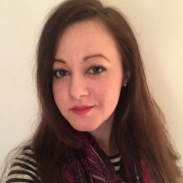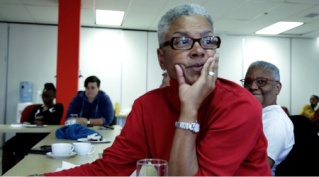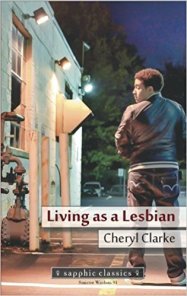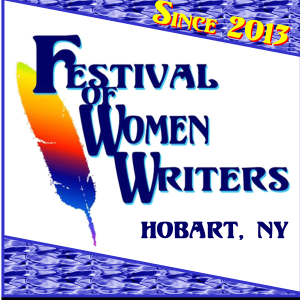Hobart Festival of Women Writers’ co-organizer, Cheryl Clarke discusses her publishing career, the Festival of Women Writers and the importance of creating a women’s writing community.

Stephanie Nikolopoulos speaks to Cheryl Clarke 

SN: Cheryl, tell us when and how you began your writing and publishing career.
CC: I have liked to write since I was in grade school. My books are: Narratives: poems in the tradition of black women (1982), Living As A Lesbian (1986), Humid Pitch (1989), Experimental Love (1993), the critical study, After Mecca: Women Poets and the Black Arts Movement (Rutgers Press, 2005), and The Days of Good Looks: Prose and Poetry 1980-2005(Carroll and Graf, 2006). I continue to write poetry and essays. My latest manuscript is the poetry collection, By My Precise Haircut, Though I have written many essays over the years relevant to the black queer community, “Lesbianism: an act of resistance,” which first appeared in the iconic This Bridge Called My Back: Writings By Radical Women of Color (Anzaldua and Moraga, eds., 1982) and “The Failure to Transform: Homophobia in the Black Community,” which was published in the equally iconic Home Girls: A Black Feminist Anthology (Smith, ed., 1984) continue to be favorites.






I consider myself a scholar of Audre Lorde and continue to write about the impact of Lorde’s work. I wrote an introduction to the lovely and voluminous G.R.I.T.S., An Anthology of Writing by Southern Black Lesbians (Williams, ed., Media Arts Project, 2013). I retired from Rutgers University in July of 2013 after 41 years of administration and teaching in New Brunswick, N.J. With Barbara J. Balliet, my life partner, I am co-owner of Blenheim Hill Books in Hobart, N.Y., the Book Village of the Catskills. We have lived in Hobart since 2005. We are involved in the organization of the Hobart Festival of Women Writers with my sister, Breena Clarke.
SN: Why did you want to create a Festival specifically geared toward women writers?
CC: Actually, Breena is the one who had the idea to present a Women Writers’ Festival in Hobart.. Along with county fairs, festivals are a tradition in Upstate New York. We thought a festival featuring women writers who have published work would be good for the region and attract people from outside the region. There are also many writers up here in these mountains. Many people who write seriously, whether or not they publish. Also, women’s writing needs greater recognition by the general public and by other women writers. So, we garnered support from various Village leaders, contacted women writers in our networks, and put the first Festival together in 2013.
SN: How has the Festival changed in the past five years?
CC: Our workshops are more developed and responsive to what Participants asked for on our evaluations. In 2015, we added the six-hour Writing Intensive, which appeals to Participants who have an actual book project and want to get some feedback and advice. We have also made our Public Readings and Public Conversations open to the larger community, not only the Festival Participants. Last year’s Public Conversation was on the writing of memoir; this year’s is on art and politics. We have tried to add a new activity each year. This year we will have a public poetry installation and a surprise event. And most importantly, have maintained our commitment to the diversity of our Participating Writers.
SN: What sort of success stories have you seen come out of the festival in terms of participants honing their craft, finding literary community, discovering new authors to read, and/or expanding their own readership?
CC: I think “finding literary community” has been an important “success story” for Writers as well as Participants. We have created community among the nearly fifty writers who have participated in the Festival. Participants who have enjoyed our craft workshops return each year to participate with Writers they have enjoyed in past years. We have certainly brought new voices for lovers of literature to hear and read. By the same token, Festival of Women Writers’ readership is expanded, and we know this because of the success of our Festival book sales. As Breena would say, “The Festival is really good for women and really good for Hobart.”
SN: How do you think someone can best prepare for attending the festival? Once at the festival, how can someone get the most out of the weekend?
CC: Well, I don’t know if any particular preparation is necessary, Stephanie. But certainly, having an idea of what you want to learn is helpful. If you are an emerging writer, have an idea of where you are in your process, e.g., beginning a manuscript, in the process of editing it, ready to publish your work. If you are more seasoned: consider one of the Writing Intensives, which gives you six hours with a professional writer. Just general questions for writers: Do you have a body of work? Do you want to publish? Do you belong to a writers’ group or do you have a network of writers you hang out with? Do you participate in public readings—especially if you are a poet? What writers do you most admire—living or dead?
I would advise not waiting until the last minute to decide which workshops you want to take. Go to www.hobartfestivalofwomenwriters.com Peruse our offerings carefully. Decide which of our workshops will move you to the next stage.
SN: You are a well-established writer who’s given so much to other writers by founding and organizing this Festival. How has the Festival impacted your own sense of literary community or your own writing?
CC: Well, I have been publishing since 1977. I have been a member of the lesbian feminist community since then. I spent nine years editing a lesbian journal, which helped me know writers—lesbian and non-lesbian writers. And indeed knowing I have an audience for my work has helped me continue to write. Working on the Festival since 2013 has been a way to continue connecting with new audiences—and a new community of writers. For more information about Cheryl Clarke and her work: http://www.cherylclarkepoet.com
There is still time to register online for Festival of Women Writers 2017, BUT NOT MUCH!
go to www.hobartfestivalofwomenwriters.com to register online.
ON SITE REGISRATION IS POSSIBLE, BUT SOME WORKSHOPS WILL BE UNAVAILABLE.
All readings and our Public Conversation On Art and Politics are free and open to the public.
There is still time to support the literary arts. Support our Indiegogo Fundraising Campaign: Indiegogo Campaign



